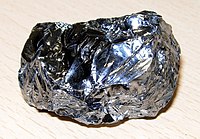
Photo from wikipedia
OBJECTIVE This study aims to analyze the addition of niobium silicate particles to dental adhesive resins and evaluate its physicomechanical and biological properties. METHODS The SiNb particles were produced by… Click to show full abstract
OBJECTIVE This study aims to analyze the addition of niobium silicate particles to dental adhesive resins and evaluate its physicomechanical and biological properties. METHODS The SiNb particles were produced by the sol-gel route and presented a mean particle size of 2.1 μm and a specific surface area of 616,96m2/g. An experimental adhesive resin was formulated with 66 wt% Bisphenol A-Glycidyl Methacrylate and 33 wt% Hydroxyethyl methacrylate with diphenyl(2,4,6-trimethyl benzoyl)phosphine oxide as the photoinitiator. The SiNb particles were incorporated into the adhesive resins in 1 wt% (SiNb1%) and 2 wt% (SiNb2%) concentration. A control group (SiNb0%) without the addition of particles was used. The developed adhesives were evaluated by their polymerization kinetics, refractive index, softening in solvent, cytotoxicity, mineral deposition, ultimate tensile strength, and micro shear bond strength. RESULTS The refractive index range was increased by the addition of niobium silicate particles. No statistically significant difference was found between groups in the degree of conversion,.softening in solvent analysis, cytotoxicity and ultimate tensile strength. The deposition of minerals increased after immersion of specimens in SBF after 14 days on the SiNb2%. The SiNb2% group showed high micro shear bond strength values, reaching 33.87 MPa. CONCLUSION In the present study, the addition of 2 wt% of niobium silicate into dental adhesive resins promoted the mineral deposition with increased bond strength without affecting other material properties. CLINICAL SIGNIFICANCE Bioactive fillers must maintain the physical-chemical properties of dental adhesives, guaranteeing their clinical performance. Niobium silicate particles could promote the remineralization of dentin hard tissues without compromising the physico-mechanical properties on these materials.
Journal Title: Journal of dentistry
Year Published: 2020
Link to full text (if available)
Share on Social Media: Sign Up to like & get
recommendations!